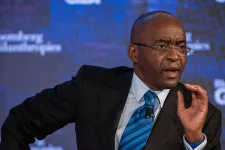CASSAVA Technologies picked South Africa instead of Zimbabwe to build Africa's first artificial intelligence factory with Nvidia. This decision runs counter to President Mnangagwa's push for outside business investments in Zimbabwe. The company, started by Zimbabwean businessman Strive Masiyiwa, will place powerful AI computers at its South African centers starting June. It plans to expand these systems later to Egypt, Kenya, Morocco, and Nigeria. The choice shows how South Africa leads the race for AI development across the continent.
Mnangagwa took control of Zimbabwe through military action in November 2017. He quickly told the world Zimbabwe welcomed business partners from everywhere. His plan seemed clever at first glance as a way to pull money into the country. Yet repeatedly, the government has created problems that scare away possible investors. Their actions have often worked against their stated goal of making Zimbabwe an attractive place for business growth.
Nvidia will supply special graphics chips that power AI systems for CASSAVA's data centers. As these systems become active, South Africa stands to gain major advantages. The technology gives South Africa a head start against other African nations trying to develop AI capabilities. During his speech at the Global AI Summit in Rwanda, Masiyiwa spoke clearly about why he skipped Zimbabwe. He pointed to problems with the business climate as his main reason.
Masiyiwa urged African leaders to make their countries friendly toward investors. He explained that business people raising billions for tech projects must go where the money feels safe. He stressed that companies simply leave without explanation when countries fail to create the right conditions. The message aimed directly at leaders who want technology investments but haven't fixed basic problems that keep those investments away. His comments highlighted the practical needs of business rather than political promises.
ICT Minister Tatenda Mavetera admitted that Zimbabwe faces challenges making itself attractive to tech investors. She shared plans to speed up approval processes for tech projects and create tax benefits for research partnerships. Her social media posts mentioned upcoming policies for tech startups, venture capital, financial technology, and cryptocurrency. Mavetera promised more investor-friendly rules specifically for information technology companies. She expressed hope these changes might help Zimbabwe become a future technology center.
Masiyiwa built Econet Wireless during difficult times in Zimbabwe during the 1990s. He has publicly thanked Vice President Joshua Nkomo for helping him start his company despite many obstacles. Critics of President Mnangagwa quickly pointed to the CASSAVA decision as a major failure of leadership. Many see the lost opportunity as keeping Zimbabwe behind as digital technology advances across Africa. The situation has become another point of criticism against the current government's economic policies.
Mnangagwa took control of Zimbabwe through military action in November 2017. He quickly told the world Zimbabwe welcomed business partners from everywhere. His plan seemed clever at first glance as a way to pull money into the country. Yet repeatedly, the government has created problems that scare away possible investors. Their actions have often worked against their stated goal of making Zimbabwe an attractive place for business growth.
Nvidia will supply special graphics chips that power AI systems for CASSAVA's data centers. As these systems become active, South Africa stands to gain major advantages. The technology gives South Africa a head start against other African nations trying to develop AI capabilities. During his speech at the Global AI Summit in Rwanda, Masiyiwa spoke clearly about why he skipped Zimbabwe. He pointed to problems with the business climate as his main reason.
Masiyiwa urged African leaders to make their countries friendly toward investors. He explained that business people raising billions for tech projects must go where the money feels safe. He stressed that companies simply leave without explanation when countries fail to create the right conditions. The message aimed directly at leaders who want technology investments but haven't fixed basic problems that keep those investments away. His comments highlighted the practical needs of business rather than political promises.
ICT Minister Tatenda Mavetera admitted that Zimbabwe faces challenges making itself attractive to tech investors. She shared plans to speed up approval processes for tech projects and create tax benefits for research partnerships. Her social media posts mentioned upcoming policies for tech startups, venture capital, financial technology, and cryptocurrency. Mavetera promised more investor-friendly rules specifically for information technology companies. She expressed hope these changes might help Zimbabwe become a future technology center.
Masiyiwa built Econet Wireless during difficult times in Zimbabwe during the 1990s. He has publicly thanked Vice President Joshua Nkomo for helping him start his company despite many obstacles. Critics of President Mnangagwa quickly pointed to the CASSAVA decision as a major failure of leadership. Many see the lost opportunity as keeping Zimbabwe behind as digital technology advances across Africa. The situation has become another point of criticism against the current government's economic policies.












